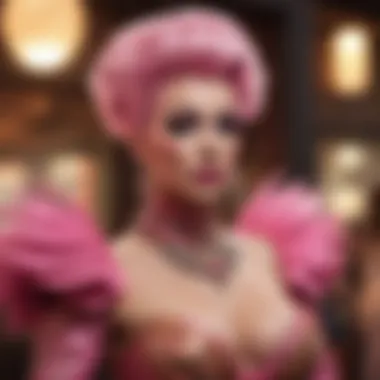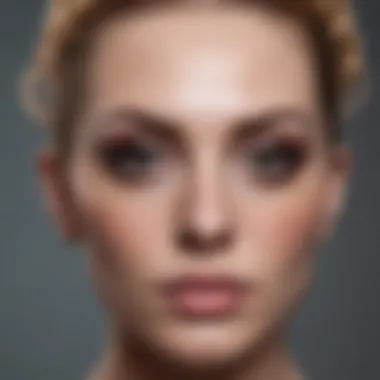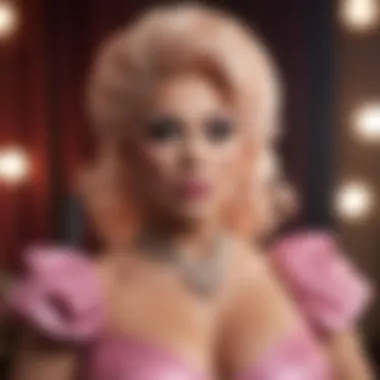The Impact of Fake Breasts in Drag Culture Today


Intro
In the landscape of drag culture, the employment of fake breasts holds profound significance. This article delves into how these artificial enhancements contribute to identity and self-expression. The impact is not just confined to aesthetics but extends into deeper realms concerning body image and societal norms. Drag performers manipulate these elements to create a visual spectacle while engaging audiences in a powerful dialogue about identity.
Fake breasts serve as a tool that allows performers to challenge conventional definitions of femininity and masculinity. Their use creates layers of interpretation, inviting both admiration and critique. As we navigate this topic, we shall seek to unpack the complex relationships between visual aesthetics and performance art within the vibrant art of drag.
Overview of Cinema/TV shows/Games/Comic Books
While drag culture inherently thrives in vibrant performance settings, cold cinema, television, and even comic books have traversed the realm often. These mediums bear witness to how representations of drag culture reflect societal changes. In recent years, notable media such as Pose and RuPaul's Drag Race have advanced conversations surrounding gender and identity. The awareness pushed into society from these representations highlights the functionality and importance of fake breasts in drag artistic expression.
Latest Updates and News
The evolution of drag continues to shape trends observed in other media. Recently, mainstream media features have taken a bold step by incorporating fake breasts as part of their narratives. This not only champions gender and body expression, but particularly resonates with audiences beliving in the fluidity of personal identity. Changing narratives foster acceptance and raise awareness around the complexities of drag.
Trends and Popularity
The public's fascination with drag is palpable. As societal norms adjust, the role of fake breasts is selection for more avid exploration and recognition. Social media platforms further amplify stellar performances, drawing in larger audiences. With notable televised competitions, the community sees increased engagements.
Notable Mentions
- RuPaul's Drag Race: Shows the transformation of performers and their use of body enhancements.
- Pose: Engages with performance as a modality of identity declaration.
Each citation contributes deeper understanding and validation to existance of fake breasts in contemporary expression. Departing from conventional norms challenges stereotypes, fostering acceptance.
In-Depth Analysis
The exploration of fake breasts in drag opens discussions surrounding constructed identities. The use of artificial enhancements modifies how viewers perceive femininity or masculinity according to how audiences perceive gender norms indicated visially.
Character Development
Drag performances often showcase personas embodied through female characters in drag. Each character finds invention in their likelihood be visually transitioning sashaying between artifice and authenticity. Through this lens, performers find resurgence of identity and self-affirmation.
“The expression via drag leads to endless reinterpretations of identity.”
Understanding this empowers performers and audiences alike. Reflecting the realities and optics around body positivity builds community connections.
Behind the Scenes
Unpacking drag culture wouldn't be complete without insight into the preparation and artistic direction involved. Professionally applying fake breasts is not purely aesthetic but arises from motivation—audacity for pushing culture.
Production Insights for Cinema/TV Shows
Behind many celebrated films and series that spotlight drag culture is fruitful creative collaboration. Costume makers play crucial roles and take significant part in manifesting drag identities. The inclusion of fake breasts marks layered visual experience central to performances in non-performance contexts. Their creation demands precision, ensuring balance between artistic selection and bodily dignity.
Reviews and Recommendations
Criticism of conveyance of identity in drag performance is inevitable. Examining audience responses helps navigate quality and genuineness etched into performances accentuated by fake breasts.
Critic Reviews and Ratings
Essays and reviews conducted by connoisseurs often indicate high scores citing authenticity and connection as major themes. Within, many dismiss outdated gender expressions enriching transforming conformity.
- Artistic intricacies rated blessed high, while identity dialogues find themselves adapting steadily in rooms unnoticed.
- Audiences flourish witnessing genuine emotions – days in authentic expressions tend to evoke personal judgements.


Prologue to Drag Culture
Drag culture plays a significant role in contemporary art and performance. It serves as a vivid representation of gender expression, theatricality, and community activism. Within this landscape, the use of fake breasts stands as a prominent feature, deeply intertwined with the narratives of transformation and identity. Understanding this aspect requires a closer examination of the underlying principles that define drag culture itself.
Definition and Origins
Drag culture has its roots in theatrical practices where men and women would perform roles opposite to their biological sex. Its historical origins can be traced back to various forms of performance art throughout centuries. From Shakespearean plays, where female roles were portrayed by men, to early 20th-century vaudeville acts, the practice challenges traditional gender binaries. In more recent decades, drag has evolved into a celebration of queer identities, gained visibility through media outlets, and has influenced broader discussions of gender and sexuality.
The term 'drag' is believed to derive from the attire worn by male actors in early theatrical performances, often dragging their gowns across the stage. Drag is now recognized as a complex socio-cultural phenomenon, embodying varied forms of expression based around performance art, costumes, humor, and music. It not only entertains but also opens space for conversations about what it means to exist outside normative gender confines.
Evolution Over the Years
The journey of drag culture illustrates a timeline marked by creativity, adaptation, and resistance. As the landscapes of both society and entertainment have shifted, so too has the art of drag. In the mid-20th century, drag shows began to appear in underground venues. Performers such as RuPaul contributed to bringing drag into a more mainstream consciousness with cable television and reality shows helping elevate its profile.
Throughout the years, drag has expanded its boundaries beyond simplistic caricatures of gender. The styles and performances have grown richer and diverse. Performers now integrate technology, mixed media, and political commentary into their acts, unveiling layers of societal critique and affirmation of identity. Inclusive of various cultures, intersections in race and sexuality are now explored more than ever in drag activities, making it an avenue for broader gender fluidity and representation.
As noted in ongoing discussions within drag communities, the trend towards embracing a wide range of gender identities reflects not only artistic evolution but also a fresh approach to debates on physicality and representation.
Overall, examining the importance of drag culture contextualizes the significance of how fake breasts function as tools of performance, further elevating the conversation around self-expression, gender expectations, and cultural feedback.
Understanding Fake Breasts in Drag
In drag culture, fake breasts serve as a not only a styling choice but also a powerful medium to explore and express identity. These enhancements, made from various materials, can profoundly influence outcomes in performances. They provide a visual cue that represents femininity or femininity expression, enabling performers to connect more deeply with their characters and audience. The role of fake breasts transcends mere aesthetics; they help in challenging traditional notions around gender and beauty, open dialogues around body image, and inspire self-acceptance.
The complexity involved in choosing materials and mastering their application is crucial, as it impacts overall wearability and realness. As we delve into materials first, it’s important to recognize that each type presents different benefits and practical considerations.
Materials Used
The variety of materials used for fake breasts in drag ranges from silicone to foam, each providing unique attributes that influence comfort and visual outcome.
- Silicone: Known for its realistic look and feel, silicone breasts create an authentic appearance. They often mimic human skin more effectively than other materials, giving performers a sense of confidence and appeal. Silicone products can be heavy, thus requiring strong support structures in outfits.
- Foam: Lightweight, foam options are also common. They allow for more effortless movement. While foams are considered less realistic than silicone, they can be customized easily in terms of shape and size.
- Latex: An option that many use is latex. It can be shaped and molded to fit various styles, but it's important that proper precautions regarding allergies are taken. You just need to find the right balance between comfort and appearance.
Knowing the proper care and limitations of these materials is important for any performer or love of drag. It carries implications for durability and wearability during performances and events.
Techniques for Application
Applying fake breasts in a drag setting is an art that requires both skill and technique. Achieving a natural look can often take substantial practice and dexterity. Here are some common methods:
- Adhesive Methods: Many drag queens use specialized adhesive for attaching artificial breasts to their body. These adhesives must be skin-friendly and durable to stay secured throughout performances.
- Binding Techniques: Gamorog addition to your routine, you can choose to bind or tape the breasts to the chest. If done correctly, this adds stability and ensures they stay in place.
- Costabling and Outfit Integration: Integrating the breasts into costumes can enhance the overall visual output. This may involve tailoring clothing that accommodates the enlarged profile smoothly. Performed skillfully, this technique serves a dual effort of drama and comfort.
- Makeup Integration: Finally, using makeup in tandem with fake breasts creates a seamless blending with other body features. Illusions of depth or contrast further reinforce their realism and impact.
Discovering these materials and application techniques can assist any performer to navigate the complex landscape of drag. Their choices can deeply influence how a performer delivers their narratives and how it is perceived. Each method used paves the way towards personalized expression that further illuminates the diverse themes at play within drag culture.
The Aesthetic Appeal of Fake Breasts
The use of fake breasts in drag culture plays a significant role in shaping both the aesthetics of performance and the identity of the performer. This section discusses the importance of the aesthetic appeal associated with faux breasts and how they contribute uniquely to drag artistry.
Visual Impact in Performances
Fake breasts are critical in enhancing the visual elements of drag. They create an exaggerated, often hyper-feminine silhouette that is integral to many performances. This visual transformation helps to blur traditional gender lines, fostering an environment where self-expression flourishes. The use of breasts can add dramatic flair to performances, making them more engaging for the audience.
Specific visual elements include:
- Proportional balance: The addition of curvy features complements outfit designs and heightens dramatic effects.
- Emotional connection: Performers often use their look, including fake breasts, to convey stories or characters, drawing the audience into a narrative frame.
- Color and texture: The materials used, ranging from silicone to various types of foam, allow for creativity in shapes and colors, which can be tailored for every performance's theme.


The focal point of many acts relies dismantling and recreating aesthetic norms. Fake breasts, then, are not just accessories; they act as a canvass where performers paint their identity and challenge societal parameters of beauty and gender. They crucially impact audience engagement and allow for deeper emotional resonance during each performance.
"To wear these costumes and prosthetics is to engage in a conversation about identity beyond societal expectations."
Costuming and Overall Look
Costuming in drag relies heavily on the strategic design of outfits, of which fake breasts are a central element. These contours add layers to the overall display of flamboyance and audacity prevalent in drag performances. The symmetry and form introduced by breasts can significantly enrich costume design.
When considering the integration of fake breasts into costuming, producers must keep the following factors in mind:
- Multiplier effect: Fake breasts enhance the visual complexity of costumes, ensuring their portrayal becomes multidimensional.
- Collaboration: Designers work closely with performers to select materials and styles that suit the desired aesthetic. Genuine collaboration ensures a harmonized look that doesn’t just rely on one element but makes the entire costume appear cohesive.
- Performance duration: Comfort and stability are essential during performances. A good design ensures that fake breasts directly align with the overall outfit structure, allowing performers to move freely without concern.
The addition of fake breasts therefore serves as more than a catch-22 of design; it enhances the clarity of the performer's vision while engaging deeper themes related to identity and presentation. These crafted forms contribute symbiotically with the components of performance, as drag acts radically shift expectation and visibly challenge normative frameworks surrounding beauty and gender.
Fake Breasts as a Statement of Identity
Fake breasts play a crucial role in how drag performers express themselves and their identities. In drag culture, they are not merely cosmetic additions; they symbolize a deeper conversation about gender, identity, and societal roles. Understanding this relevance is key for grasping the complexities involved in drag performances.
Gender Expression and Fluidity
In the realm of drag, fake breasts contribute significantly to gender expression. They allow performers to enhance feminine traits that might align with their artistic intentions. By wearing fake breasts, artists can present a visual identity that contrasts sharply with their biological sex.
This move can be described as an articulation of fluidity within gender identities. More than just theater, drag has opened discussions. Many performers use this medium to showcase the spectrum of gender rather than a binary conception. This exploration facilitates a conversation about what it means to be masculine or feminine, highlighting the loose boundaries of these elements. Artists adapt, challenge, and redefine expectations, leveraging fake breasts as a powerful tool in this quest for self-identification.
"Drag is the ultimate statement of being who you want to be, regardless of societal expectations."
Cultural and Societal Implications
The adoption and use of fake breasts in drag highlight broader cultural and societal implications. In many societies, physical appearance heavily defines social roles. By incorporating artificial enhancements, drag performers provoke thoughts about beauty standards, gender norms, and expectations.
- Challenging Beauty Norms: Fake breasts transcend just being physically appealing; they drive the conversation of beauty standards forward. Performers challenge traditional beauty ideals and facilitate acceptance of diverse body images.
- Empowerment: From a societal perspective, fake breasts can act as symbols of empowerment. They can promote body positivity by illustrating that identity doesn’t strictly conform to biological attributes.
- Criticism of Mainstream Culture: Also, by utilizing props that further sexualize their performance, many drag performers critique societal norms regarding sexuality and attraction without fear. This challenges viewers' perceptions of gender roles and expands the narrative around them.
In summary, the role of fake breasts in drag culture lays bare a multitude of conversations regarding identity, societal definitions of gender, and norms that outline critique and empowerment. They are not just aesthetic choices; they emerge as significant factors in how performers navigate a complex web of identity, culture, and perception.
Challenges and Critiques Surrounding Fake Breasts
The use of fake breasts in drag culture evokes both admiration and critique. While many celebrate them as tools for expression and fantasy, others raise concerns about the implications for body image and societal perceptions. It is important to understand these discussions, as they illuminate the complexities of identity and representation in drag culture.
Body Image Issues
The quest for self-expression through drag performance often intersects with deeply personal issues regarding body image. For some performers, the process of enhancing their bodies with artificial elements can be empowering. The act of transforming one's appearance may help many individuals explore their identities in a way that feels affirming.
However, not all responses are positive. Critics argue that the celebration of exaggerated forms can mimic broader societal pressures. This leads some to question if reliance on fake breasts further entrenches unrealistic beauty standards. These critiques raise important considerations regarding mental health and self-acceptance. The tools that elevate drag performance must also promote positive self-image, rather than contribute to damaging societal expectations.
Discussions surrounding body image in drag often consider the following:
- Impact on mental health and self-esteem.
- Reality versus expectations of beauty in society.
- Conversations about authenticity in personal expression.
Perceptions by the Mainstream Audience
The awareness and understanding of fake breasts in drag is heavily influenced by perceptions from acertain sectors of mainstream audiences. Many viewers may regard this usage as merely entertaining - a spectacle designed to shock or enchant. Despite this enthusiasm, it can lead to a misunderstanding of drag as an art form that transcends superficiality.
Apprehension often comes from a lack of knowledge about the nuances within drag culture. When audiences fail to recognize the intentionality behind choices like body enhancements, it creates a barrier to robust understanding. This gap can perpetuate stereotypes about those who participate in drag and limit broader appreciation for the complexities of gender expression.


Addressing these perceptions requires nuanced marketing and portrayal of drag artists. Key discussions include:
- The importance of education in and about drag.
- Refuting stereotypes that trivialize drag.
- Building alliances with the LGBTQ+ community for better understanding.
Ultimately, whether embraced or critiqued, fake breasts in drag culture serve as significant focal points for broader discussions on identity, representation, and societal values.
Technological Advances in Drag Performance
In recent years, technological advancements have played a pivotal role in shaping drag culture. These innovations have not just influenced how drag performances are presented but have also altered the very essence of identity and self-expression in drag. The importance of technology in this realm cannot be overstated. It enhances performers' abilities to transform and connect with their audiences in ways that were once impossible.
Innovations in Makeup and Props
The world of makeup and prop design has seen revolutionary changes that dramatically affect drag performance. High-quality products are now developed using advanced formulations that meet the unique demands of drag make-up artistry. This includes waterproof foundations, bold pigments, and glitters that don't irritate the skin and can withstand the rigorous nature of live shows.
Additionally, 3D printing technology has enabled the rapid creation of custom props and accessories. For example, performers can design flamboyant wigs or intricate headpieces to match specific characters or themes. This customization offers a greater degree of creativity, appeal, and precision that resonates with both performers and audiences.
Another pertinent area in innovation includes the utilization of LED and digital displays in costume design. Costumes now often integrate lights and sound, allowing performers to create on-stage effects. This leads to what can be described as storytelling through visual spectacle.
Virtual and Augmented Reality in Drag
The advent of virtual and augmented reality is poised to redefine experiences within drag culture. To convey complex ideas and narratives, drag artists have begun to explore these technologies. They can transport audiences to new digital realms. Virtual drag shows can become more immersive, engaging viewers from the comfort of their home while providing real-time interactions with performers.
Augmented reality also offers opportunities for intricate costume visualization. An audience could see layers of fantastical elements appear on screen. This enhances the overall connection between performer and spectator. Moreover, virtual apps can allow fans to create and share their own drag characters, blurring the lines between performance and personal identity.
The Future of Drag and Body Representation
The future of drag culture is poised at the intersection of innovation and tradition. As we witness artists experimenting with various elements of performance, the role of fake breasts continues to evolve. This examination highlights how they not only function as embellishments but as vital expression tools. We will explore emerging trends, their influence on identity, and how they seek to redefine beauty standards.
Emerging Trends and Styles
In recent years, a noticeable shift in drag aesthetics has become evident. The internet and social media platforms have revolutionized performance styles and personal expressions. Artists are moving beyond traditional silhouettes towards more experimental forms. This change often reflects broader cultural movements.
- Inclusive Designs: There is a growing focus on inclusivity in drag. Performers are embracing diverse body types, challenging conventions related to gender and beauty standards. Some show performers pairing fake breasts with unique body shapes, showcasing personal journeys and stories. Models explore unconventional stylings which invite spectators to reconsider norms.
- Technological Integration: Innovations in materials and designs of fake breasts are proving enabling in shaping to performer's needs. From mission to enhance drag styles to comfort in performances, developments aim to improve aesthetics and user experience. Incorporating smart materials or 3D printing may usher in entirely new possibilities.
The incorporation of virtual influences means that drag may further transcend physical spaces. Whether through virtual reality environments, where drag communities flourish digitally, or augmented reality enhancing actual shows, the blend widens the scope of representation. Drag queens and kings now express their art not just on stage but also in online platforms, reshaping the narratives.
Redefining Beauty Standards
As drag culture progresses, the standards of beauty are continuously challenged. This effort is largely liberating, increasing acceptance of diverse expressions. Fake breasts fulfill profound purposes in this debate, occupying a balance between desirability and absurdity. Performers not only challenge gender norms but strive to redefine what beauty can encapsulate.
- Versatile Representation: Today, using fake breasts can symbolize a divergence from traditional femininity. Possible interpretations reflect a punk acceptance of extreme aesthetics, reclaiming power in appearances. By using enhancements, performers propel conversations forward on who gets to definebeauty.
- Visibility for All: The conversation around fake breasts extends to their visibility in mainstream media. Conversations contribute to overall discussions beyond the drag stage—entering into discussions seen through cineamas or other traditional screens. This enables broader audiences to observe new dialogues around gender fluidity and body autonomy, thereby reducing stigma.
The future stages of drag culture will not only reflect emerging beauty standards but also challenge and redefine them for generations to come.
Epilogue
Summary of Key Points
In summary, fake breasts play a significant role in drag culture. They serve not just as a physical enhancement but also as a medium for self-expression. The key points discussed in the previous sections include:
- The origins and evolution of drag culture, illustrating how fake breasts became a staple in performances.
- The materials and application techniques used to create realistic-looking breasts that contribute to the visual allure of drag acts.
- The aesthetic impact of fake breasts in performances, highlighting how they shape the character and costume.
- The importance of fake breasts in expressing a fluid sense of gender identity and their broader cultural implications.
- Critiques regarding body image and the perceptions faced by performers as a result of societal expectations.
- Technological advancements that influence drag performance and enhance the use of fake breasts.
- Emerging trends that indicate the future of drag culture and body representation.
These points intertwine to create a comprehensive understanding of how fake breasts enrich drag performances.
The Enduring Significance of Fake Breasts in Drag
The significance of fake breasts in drag is powerful and enduring. They entail more than just aesthetic pleasure—they encapsulate a deeper dialogue about gender, identity, and creativity within the community. These attributes give performers the freedom to articulate expressions of self uniquely.
As performers push the boundaries of traditional gender roles, fake breasts become tools of empowerment. Brutal to many social norms, they allow individuals to reconstruct their bodies in a way that fulfills their artistic vision. The endurance of this practice affirms not just personal identity but also challenges societal constructs of beauty and gender.
Moreover, the integration of fake breasts in drag reverberates beyond performance spaces, influencing the media and public. As varying standards of beauty are championed, multiple colors, shapes, and sizes no longer occupy traditional confines. Respect for diversity in bodily representations—initiated by drag—gradually extends into broader societal acceptance.



